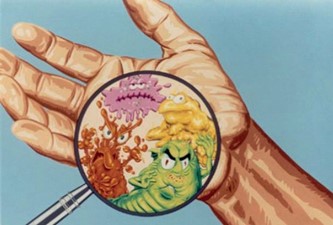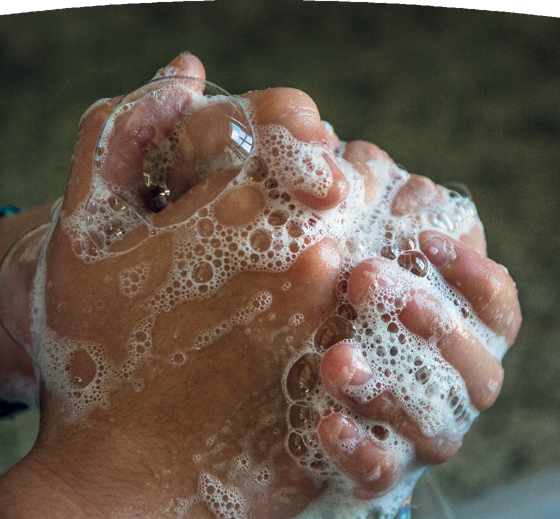Control and advice at home – Information for patients and carers
If you are healthy you are not at an increased risk of getting an infection. You are at risk if you have been on antibiotics, have a life-limiting illness are or receiving chemotherapy.
If a member of your family is known to have an infection they may risk spreading the infection to you and the person you are caring for.
This leaflet helps to explain how you can help to minimise the risks of infection.
Germs
Throughout our daily lives we are exposed to germs. Most of the time our bodies’ defence systems protect us and we do not become ill.
Germs get into our homes all the time – on people, food, pets and sometimes through our water supply.
It is difficult to know how many germs are needed to create or cause an infection as it depends on each individual, how contagious the germ is and if the environmental conditions encourage it to spread easily.
For example there are lots of germs in a toilet bowl but the risk of the germs spreading are low. However, cleaning cloths, towels and mops that come into contact with the germs can, if not used correctly, cause the spread of infection.
Cleaning is very important as germs do not have anywhere to live once the dirt has been removed. Best practice is to clean regularly (particularly high- risk areas e.g. bathrooms and kitchens).
If you are a carer the most important surfaces are those that come into contact with hands (door handles, telephones, bedside tables and bed frames. These areas can be cleaned with hot water and detergent.
Divan beds can be vacuumed regularly.
In a busy house, you can’t always keep surfaces that are in contact with hands clean. This is why you need to wash your hands as often as you can to stop the germs spreading around the home.
Cleaning equipment
Cloths, mops, towels and sponges spread infection because they are damp and are an ideal breeding ground for germs. After use they need to be washed and dried. Alternatively use disposable ones or good quality kitchen towels.
Micro fibre cloths and mops are particularly good for cleaning and last a long time. All cleaning equipment should be laundered at the highest temperature the material will allow.
What is on your hands
Resident micro organisms (germs)
These are deep seated and difficult to remove forming part of the body’s natural immune system. They rarely cause infections.
Transient micro organisms (germs)
These are superficial and easily spread from person to person and are an important cause of infection. These are removed with good hand washing.

Washing hands using soap and water and drying thoroughly removes 90-95% of transient organisms.
When to wash your hands
- If your hands are dirty
- If you have been in contact with blood or bodily fluids
- After you have been to the toilet
- Before you prepare food
- Before you eat
- After you touch raw meat
- After you have cleaned your house
- After you feed or touch pets
- After gardening
- After you handle rubbish
- After you wash soiled cloths
- After coughing or sneezing
High risk areas in your home
Kitchens and bathroom are the high risk areas in your home.
The following can prevent cross infection:
- Wash hands before you touch food
- Clean the kitchen before the bathroom
- Clean the dirtiest areas last
- Make sure the seal on your fridge door works and the door closes properly
- Put raw meat at the bottom of your fridge and ensure food is in date
- Always wash your hands after using the toilet
- Clean your toilet regularly with a lime scale remover, bleach should not be used as it can stop good bacteria breaking down solids
Cleaning up bodily fluids:
- Wear disposable gloves
- Clean floors or other surfaces that have come into contact with faeces or vomit
- Remove as much of the solid matter from the surface as you can using a paper towel or disposable cloth
- Clean the surface with hot water and detergent using a fresh cloth or paper towel
- On removal of gloves wash hands and dry thoroughly
- Dispose of all waste in your household waste.
Washing/laundry
- Never share face cloths, razors or toothbrushes
- Wash clothing at the highest temperature the fabric will allow
- Tumble drying helps to kill bacteria
- Wear rubber gloves when dealing with soiled linen.
Catheter bags and stoma bags
- Wash hands and dry thoroughly prior to emptying and changing the bag
- Wear disposable gloves
- Wrap in a plastic bag and dispose of in your normal household waste.
Waste
- You can treat waste in your home as household waste, including empty colostomy bags, empty urine bags, pads, wound dressings, oxygen and nebuliser tubing.

